| SHADOWS ON THE WALL | REVIEWS | NEWS | FESTIVAL | AWARDS | Q&A | ABOUT | TALKBACK | |||||
 Shadows off the beaten path Shadows off the beaten pathIndies, foreign, docs and shorts...
On this page:
HIT THE ROAD |
PETROV'S FLU |
PLAYGROUND
| |||||
| See also: SHADOWS FILM FESTIVAL | Last update 12.Oct.21 | |||||
|
Hit the Road Review by Rich Cline | 
| |||||
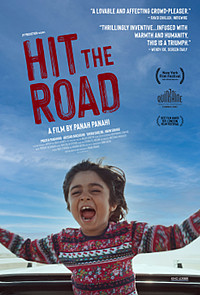 dir-scr Panah Panahi prd Mastaneh Mohajer, Jafar Panahi, Panah Panahi with Hassan Madjooni, Pantea Panahiha, Rayan Sarlak, Amin Simiar release UK Oct.21 lff, US Oct.21 nyff 21/Iran 1h33 CANNES FILM FEST  Is it streaming? |
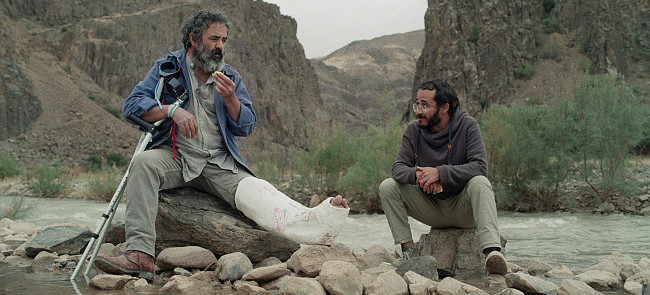 Despite its sparky sense of humour, a sharp melancholy underscores this Iranian road movie. Writer-director Panah Panahi (son of auteur Jafar) takes the audience on a trip that feels both boisterously rambunctious and darkly momentous at the same time. The four family members stuck together in this car are each revealed to be complex, observant and deeply emotional, even as they maintain their ability to make each other laugh. Heading north from Tehran, Farid (Simiar) is driving his stoic mother (Panahiha) and crotchety father (Madjooni), whose leg is in a cast as he complains about a toothache. Meanwhile, younger brother (Sarlak) is a hyperactive bundle of opinions and nonstop activity. His mother is concealing the nature of the trip from the youngster, and also hasn't told him that their cute dog Jessy has a terminal illness. The truth is that they're taking Farid to be smuggled over the border to safety. And their own life won't be the same when they get home. These four people continually exchange stories and banter, insulting and teasing each other mercilessly about almost everything. Farid struggles to go along with the jokes, mainly because he's so nervous about where this journey is heading. And as Panahi quietly captures the gorgeous shifting landscape outside, various stops along the road introduce random people who add humour and irony to the situation. Each element feeds into the central narrative in a clever way that explores life in present-day Iran while also touching on universal human themes. The actors give remarkably thoughtful performances, balanced with the characters' specific senses of humour. In a star-making appearance, young Sarlak shows a surprising alertness to the things going on around him, continually throwing the entire movie into noisy pandemonium while putting even the scariest things into blistering context. Madjooni counters this with a bone-dry wit and sardonic running commentary, while Panahiha adds a concerned maternal instinct underneath her sarcasm. By comparison, Simiar's character is the most serious in the film, but then what he's facing is genuinely frightening. Panahi ably navigates the shifts in mood along the road, so the story takes in some very silly interludes as effortlessly as others that are darkly chilling. Amin Jafari's superb camerawork shifts skilfully between raucous close-up and static long shots. Dialog is peppered with references to movies from Batman to 2001: A Space Odyssey, and the characters spend a lot of time cracking each other up. But what lingers in the end are the more profound ideas that swirl through each scene, binding these family members together even as fierce individuals.
| ||||
|
Petrov’s Flu Review by Rich Cline | 
| |||||
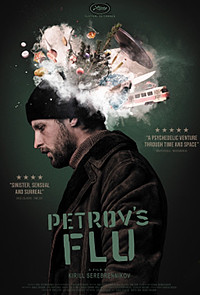 dir-scr Kirill Serebrennikov prd Pavel Burya, Murad Osmann, Ilya Stewart with Semyon Serzin, Chulpan Khamatova, Vladislav Semiletkov, Yuri Kolokolnikov, Yuliya Peresild, Yuriy Borisov, Ivan Dorn, Aleksandr Ilin, Sergey Dreyden, Olga Voronina, Timofey Tribuntsev, Semyon Shteynberg release Rus 9.Sep.21, UK Oct.21 lff 21/Russia 2h25 CANNES FILM FEST  Is it streaming? |
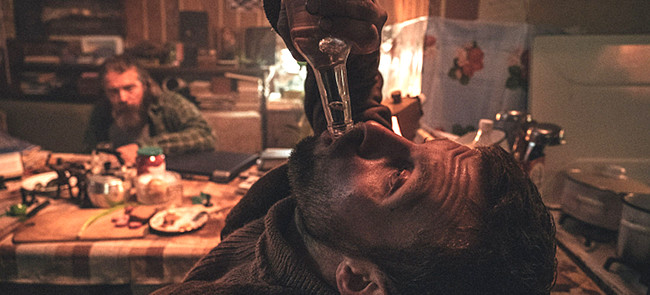 A riotous odyssey through post-Soviet Russia, this demanding epic keeps the audience on its toes, as adept filmmaker Kirill Serebrennikov moves rapid-fire through a series of full-on set pieces. The camerawork is extraordinary, often in elaborately long takes. With the titular viral infection spreading, the film has a clever timeliness, and its blackly comical tone prevents the outrageously gloomy series of events from ever feeling too heavy. On New Year's Eve, comic book artist Petrov (Serzin) isn't feeling well, but he knows it's just the flu. As he travels around his city, people moan about immigrants and how Gorbachev wrecked the country before Yeltsin finished it off. His wife Petrova (Khamatova) is a librarian who seems quiet but has a secret identity as a superhuman angel of vengeance. And their preteen son (Semiletkov) tests her patience, especially as he comes down with a fever and changes their party plans. Meanwhile, their memories, fantasies and realities reveal themselves in unexpected ways. Hallucinatory fantasies punctuate the film, deliberately blurring the line between what's real and what isn't, including a massacre of wealthy people in the street, sex in the library stacks and a grisly assisted suicide. Everyone seems to have been infected by the same malaise, a weary acceptance that there's no hope left for their nation. And details of everyday life and a wide range of characters fill the scenes. Along the way, there's some inventive animation, a black and white interlude and clever transitions between scenarios. With his hacking cough and feverish perception, Petrov is a sympathetic figure, played sharply by Serzin in a variety of situations. His soulfulness cuts through the surface, notably in a sequence with his friend Igor (Kolokolnikov). And his scenes with Khamatova have a sharp snap to them. She gives Petrova a nice layer of mystery, and hints at ongoing issues when she mentions her husband's imaginary friends. In home movies, a range of warm nostalgia is pointedly revealed, contrasting and merging with the present. Serebrennikov loads this film with rather a lot of enormous topics, wryly probing the nature of Russian culture. This includes knowing jabs at caveman masculinity and comments about the battle between traditional and internet-theory remedies. There are also running gags from the holiday Snow Maiden to low-hanging light fixtures. The constantly shifting imagery is energetic, bold and full of life. It's also a bit exhausting at this extended length, sometimes feeling repetitive or circuitous. But it provides a lot to think about.
| ||||
|
Playground Un Monde Review by Rich Cline |  MUST
MUST  SEE SEE
| |||||
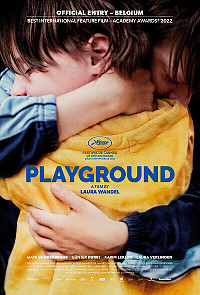 dir-scr Laura Wandel prd Stephane Lhoest with Maya Vanderbeque, Gunter Duret, Karim Leklou, Laura Verlinden, Simon Caudry, Lena Girard Voss, Thao Maerten release UK Oct.21 lff 21/Belgium 1h12 CANNES FILM FEST  Is it streaming? |
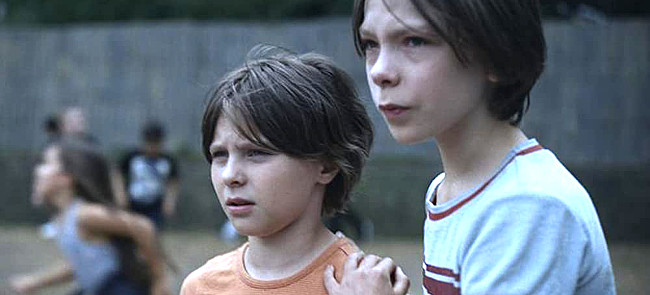 Despite a tough theme, this film has such a bracing sense of authenticity that it can't help but deeply engage the audience even as it gets under the skin with some provocative issues. Actor-filmmaker Laura Wandel shoots it with both doc-style urgency and intimate emotionality, while eliciting powerfully complex performances from a cast of young children. It's a remarkable achievement, putting us into the perspective of a little girl. On her first day of school, Nora (Vanderbeque) is frightened, relying on older brother Abel (Duret) to show her the ropes. But he's being tormented by school bully Antoine (Caudry), and doesn't want their dad (Leklou) to find out. As it evolves, this situation also affects Nora's reputation with the other girls, and when the attacks on Abel turn violent she can't remain quiet any longer. When the fallout engulfs the family and the school, no one seems to notice that Nora is learning all the wrong lessons about self-reliance, trusting authority and making friends. Watching the internal journey of this extremely bright child is both engaging and darkly wrenching, especially in improvisational scenes that bristle with personality. All of the children depicted in this film are alert to what is going on around them, even though they don't quite understand how to solve their problems. Nora is certainly smart enough to understand this new situations and to take clues from those around her about what she should do next. But of course we can see dangers she can't, so her emotional odyssey becomes powerfully moving. Wandel's camera sticks very close to Vanderbeque all the way through the film, capturing nuances in her expression that reveal her thought processes. It's an astonishingly transparent performance that continually takes us aback with its earthy honesty, warm humour and deep affection. And the side roles are equally natural. Her interaction with both Duret and Leklou is shaded by her deepening uncertainty, while quiet openness with a sensitive teacher (played by filmmaker Wandel) provides a hint of security. This is a remarkable exploration of attitudes that are usually only portrayed in movies about teenagers. But issues of peer pressure and fear of authority are already present with these much-younger kids who simply aren't equipped to interpret or respond to them. The film forces us to search for holes in the system, and it becomes clear that this school doesn't have enough teachers paying attention to children, especially on the playground. That Nora sees so much that they miss feels a bit like artistic licence, but it also makes an urgent point.
| ||||

See also: SHADOWS FILM FESTIVAL © 2021 by Rich Cline, Shadows
on the Wall
HOME | REVIEWS | NEWS | FESTIVAL | AWARDS
| Q&A | ABOUT | TALKBACK | | ||||

